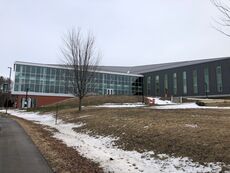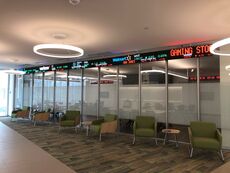
An Alfond grant will accelerate Husson tech-and-innovation programs
 Courtesy / Husson University
Brave Williams, left, director of iEX Center at Husson University, working with students in the iEX Center.
Courtesy / Husson University
Brave Williams, left, director of iEX Center at Husson University, working with students in the iEX Center.
Husson University said it received a $2.2 million grant from the Harold Alfond Foundation that will accelerate the implementation of programs for the new School of Technology and Innovation.
The school is part of Bangor-based Husson's College of Business, the largest business college in the state. The grant will help support Husson’s programs in integrated technology and the university’s new degree in extended reality.
The funding is also designed to support project research and development as well as business partnerships that will help stimulate job growth and economic development in Maine.
“The foundation is delighted to support Husson University’s efforts to grow Maine’s economy,” said Gregory Powell, chair of the Harold Alfond Foundation. “When the university’s forward-thinking, entrepreneurial, educational initiatives are combined with its commitment to improving the economic future of Maine people, the result is an unbeatable combination from an ideal community partner.”
Founded in 1950, the Harold Alfond Foundation furthers the philanthropic legacy of Harold Alfond, the founder of Dexter Shoe Co. and a longtime supporter of Maine communities in which he and his family worked and lived. The foundation favors education, healthcare and youth development, among other charitable causes.

The Alfond Foundation was a key funder early on in the development of Husson's new College of Business building. The foundation provided $4 million matching gift early on, leveraging $8 million toward an eventual $38 million capital campaign.

“This support from the Harold Alfond Foundation will help the university address some pressing workforce issues identified in the 2018 ‘Measures of Growth,’ published by the Maine Development Foundation. According to the report, there are multiple challenges that are restraining Maine’s economic growth,” said Husson University President Robert Clark.
“Two of these were the lack of innovation and a shrinking workforce,” Clark said. “This grant will allow Husson University to address both of these issues. Through education, we can develop a workforce with expertise in various technologies including extended reality. Approximately 75% of recent Husson graduates reside in Maine. Creating a high-tech workforce has the potential to transform Maine’s economic landscape and attract good paying, high-tech companies and jobs to the region.”

College graduates with a knowledge of information technology and expertise in virtual reality and augmented reality are in demand. According to data company Statista, “it is forecast that over 23 million jobs will be enhanced by virtual reality and augmented reality technologies globally by 2030, an increase from the 800 thousand jobs that were enhanced by VR and AR in 2019.”
“Having a strong understanding of technology is becoming an essential skill for all students,” said Marie Hansen, dean of Husson’s College of Business. “This knowledge can make graduates more appealing to potential employers. Companies are looking for individuals who can help them resolve business challenges utilizing the latest technology.”
Beyond problem solving, AR and VR have the potential to grow into a thriving industry. A report from PriceWaterhouseCoopers states that VR and AR have the potential to add $1.5 trillion to the global economy by 2030. While job growth in Maine’s IT sector for developers of software and applications is projected to grow 15% from 2018 to 2028, growth will be hindered if there are not enough educated individuals to fill available job vacancies.










0 Comments